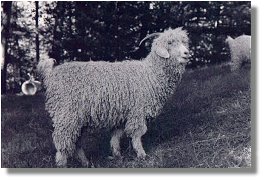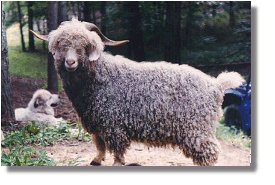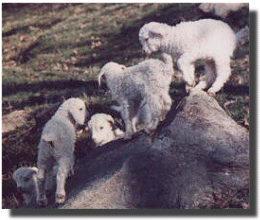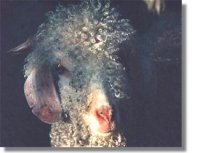|
We started our herd with seven registered, bred does, from Fletcher, NC. These goats were from a well known Texan
breeder, Jean Ebling. The does had been bred by a Nissen buck (Marshall, NC), and within weeks of bringing the does home,
our herd grew to seventeen!
 Our original nannies were sound goats. with acceptable conformation, and freedom of kemp (an undesirable hollow fiber). We set goals to continue to improve on the genetics for quality mohair while maintaining solid conformation. We have carefully
chosen breeding bucks, for fine mohair, uniformity of fleece from throat to britch, straight legs, and general thriftiness. Our original nannies were sound goats. with acceptable conformation, and freedom of kemp (an undesirable hollow fiber). We set goals to continue to improve on the genetics for quality mohair while maintaining solid conformation. We have carefully
chosen breeding bucks, for fine mohair, uniformity of fleece from throat to britch, straight legs, and general thriftiness.
Breeding with intent to continually improve the genetics of a herd is a dynamic process. Every year we build on previous
choices.
 The first buck we purchased was from Jene and SueAnn Nissen, RSN 421 (aka Curly Joe). Curly's father, BL #1205, came
from the well known Texan breeder, Ben Lockhart, and 1205 sired many top line goats. I spotted 421 while handling his 3rd
clip fleece on shearing day. This fleece tested at 24 microns average diameter, and 0.1 % kemp. His 6th shearing tested at 33
microns, and .2% kemp. The first buck we purchased was from Jene and SueAnn Nissen, RSN 421 (aka Curly Joe). Curly's father, BL #1205, came
from the well known Texan breeder, Ben Lockhart, and 1205 sired many top line goats. I spotted 421 while handling his 3rd
clip fleece on shearing day. This fleece tested at 24 microns average diameter, and 0.1 % kemp. His 6th shearing tested at 33
microns, and .2% kemp.
Curly Joe's fleece is very dry, which was a good match with our does' high lanolin content. The offspring produced fine fleeces
with enough lanolin to protect the mohair's lusture, and still be reasonable to wash.
Our second buck was from the herd, BL #1732, aka "Nelson". Nelson is the son of a well known South African
stud buck, and fine haired Texan doe. South African genetics have a significant influence in our herd. Nelson's kids are very
robust, and the fleeces have characteristic, individual ringlet locks, and high lusture.
| Annual Herd Reduction Sale-- 2004
 Kidding season at Nowhere Branch began on March 7th. We are planning to clamp several buck kids, who will
be available after they are weaned at 4 months. Wethered Angora goats are excellent additions to a spinner's
flock, since as they age, their mohair stays finer than their intact siblings. Wethers also lack the unpopular
aroma of their rutting brothers. Kidding season at Nowhere Branch began on March 7th. We are planning to clamp several buck kids, who will
be available after they are weaned at 4 months. Wethered Angora goats are excellent additions to a spinner's
flock, since as they age, their mohair stays finer than their intact siblings. Wethers also lack the unpopular
aroma of their rutting brothers.
|
Registered Adult Does
$200 - 350
Registered Yearling Does
We are offering several very nice yearling does, of sound conformation, fine fleece, and good tempermaent. Average price $300
Registered Adult Bucks
Contact us for more information. Average price is $400
Registered Yearling Bucks
Email or call about pricing.
Wethers (castrated bucks)
Wethers are popular with spinners who wantlower maintenance
fiber animals with gentle dispositions and lovely mohair. $75 after their first shearing, $95 in their first clip fleece.
 Angora goat's most endearing quality is their general curiosity.
When introduced to farm visitors, several take on the role of greeting committee!
Angora goat's most endearing quality is their general curiosity.
When introduced to farm visitors, several take on the role of greeting committee!
Worth considering....
A local buffalo breeder says he can get those powerful animals to do "anything they want to".
Some goat producers can identify with that statement, when it comes to keeping their
animals contained. If we pay attention to the goats' natural tendencies, learn what motivates them, then create management systems
that work for them and us, we will spend more time enjoying these interesting creatures and
less time chasing them!
Goats are herd animals. The social structure of the herd is part of the survival strategy.
Have you ever watched a little herd when a threat is perceived? They run or huddle in a tight
bunch. As a compact unit they don't appear as vulnerable as one by itself. Perhaps a pair of goats are more likely to be discontented
with their allotted area, because they are searching for the herd?
Goats are browsers. Especially Angora goats, given the chance, would rather be picking and moving
than hanging out in the barn at the hay rack. Allowing the goats to move about by periodically
rotating pastures helps to satisfy this natural tendency.
Lastly, goats are absolutely foolish over grain! I would have to expect them to dive through or over a hot electric fence
if a bucket of grain sat on the other side.
|

